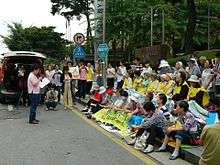Wednesday demonstration

Wednesday demonstration (Korean: 수요 집회), officially named Wednesday Demonstration demanding Japan to redress the Comfort Women problems (Korean: 일본군 위안부 문제 해결을 위한 정기 수요시위), is a weekly protest in Korea which aims at obtaining justice from the Japanese government regarding the large scale sexual slavery system established under Imperial Japan rule during World War II (its victims are commonly known under the euphemism "comfort women"). The weekly protest is held in the presence of surviving comfort women on every Wednesday at noon in front of the Embassy of Japan in Seoul.[1]
Background
The weekly protest is led by The Korean Council for the Women Drafted for Military Sexual Slavery by Japan, commonly referred to as the Korean Council.[1] The first demonstration was held on January 8, 1992, for the visit of then Prime Minister of Japan Kiichi Miyazawa, and the 1,000th on December 14, 2011.[1][2][3] The only Wednesday protest the Korean Council and former comfort women have missed since 1992 was during the Kobe earthquake in Japan in 1995.[4] The Wednesday demonstration was listed in March 2002 in the Guinness Book of Records as the world's oldest rally on a single theme.[1] Such long years of weekly protests are still on going as they believe the Japanese government has not given any sincere official apology to these victims. In 2007, current Prime minister of Japan, Abe Shinzo, mentioned how there was no "forceful" action of the Japanese government in gathering the women, which is still his stance regarding this issue until the present.[5] In December 2015, there was a deal signed by the government of President Park Geun -hye, incumbent Moon Jae-in's predecessor, and Prime minister Abe Shinzo regarding the comfort women issue, but the protest still went on as the deal was regarded as a lacking deal without the consent of the victims and forced by the Park's government's favor. Such stance has been supported by the new foreign minister of South Korea, Kang Kyung-wha who pinpointed how the two countries are at odds regarding the deal struck in 2015.[6]
Objectives
According to the Korean Council, the "Wednesday Demonstrations have turned into a place for solidarity between citizens and the victims, a living site for history education, a platform for peace and women's human rights, bringing people together in solidarity beyond gender, age, borders, and ideologies."[1] The Korean Council states that they will keep protesting until Korea has considered the rights and dignity fully restored to the victims.
Their objective in protesting is "the restoration of dignity and human rights of comfort women."[1] The Korean Council's overall objectives in fully resolving the war crimes are:[1]
- Acknowledge the war crime.
- Reveal the truth in its entirety about the crimes of military sexual slavery.
- Make an official apology by the Japanese Government.
- Make legal reparations.
- Punish those responsible for the war crime.
- Accurately record the crime in history textbooks.
- Erect a memorial for the victims of military sexual slavery and establish a historical museum.
Also, recently the Korean government claims to have a fair negotiation with the Japanese government with victims take part in. Especially after 2015 settlement that was done by President Park Geun -hye ministry without the victims.[7]
On August 14, 2018, the first official memorial day of comfort women was marked in South Korea.[8]
Pyeonghwabi
The golden bronze statue, "Pyeonghwabi" ("Statue of peace"), was inaugurated for the 1,000th rally on December 14, 2011. The statue of the Korean teenage girl sitting on a chair facing the Japanese Embassy represents all of the Korean girls forced to be comfort women.[2] The bird on her shoulder is symbolic of freedom and peace.[1][2][9]
See also
References
- 1 2 3 4 5 6 7 8 http://www.womenandwar.net/contents/custom/wednesday_demonstration/main.asp?page_str_menu=151
- 1 2 3 "Weekly 'comfort women' protest at Japan Embassy in Seoul in its 22nd year". Stars and Stripes. Retrieved 24 November 2015.
- ↑ "Okano Yayo, "Toward Resolution of the Comfort Women Issue—The 1000th Wednesday Protest in Seoul and Japanese Intransigence 慰安婦問題解決へ向けて−−ソウルにおける1000回目の水曜抗議集会と日本の非妥協性"". Retrieved 24 November 2015.
- ↑ "The Chosun Ilbo (English Edition): Daily News from Korea - Former 'Comfort Women' Hold 1,000th Protest at Japanese Embassy". Retrieved 24 November 2015.
- ↑ "Japan's Abe: No Proof of WWII Sex Slaves". Retrieved 16 September 2017.
- ↑ "Japan, S. Korea foreign ministers at odds over 'comfort women' pac". Retrieved 16 September 2017.
- ↑ CNN, James Griffiths,. "South Korea's new president questions Japan 'comfort women' deal". CNN. Retrieved 2017-11-22.
- ↑ https://mainichi.jp/english/articles/20180814/p2g/00m/0in/093000c
- ↑ "Former 'comfort women' hold 1,000th weekly protest". Retrieved 24 November 2015.